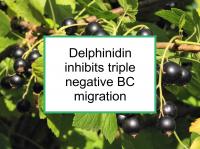Delphinidin is an anthocyanin pigment found in a variety of blue, red and purple fruits such as blueberries, black currants, and cranberries. Delphinidin typically is found together with other anthocyanins. For example, blueberries contain the anthocyanins cyanidin, malvidin, peonidin, and petunidin, in addition to delphinidin.
All blue/red/purple dark-fleshed fruits have been found to be associated with reduced breast cancer risk and recurrence. It is likely that the micronutrients in such fruits act synergistically to prevent breast cancer growth and proliferation. However, they also act individually against breast cancer cells when tested in the laboratory.
Delphinidin has previously been reported to suppress the growth of hormone receptor positive (ER+/PR+), HER2-positive (HER2+) and triple negative (ER-/PR-/HER2-) breast cancer cells. Now a new study has reported that delphinidin reduces the metastatic potential of triple negative breast cancer cells by reducing angiogenesis and inhibiting migration. Cancer cells induce angiogenesis, the growth of new blood vessels, during the early stages of tumor development in order to nourish tumor growth. Migration of cells from a breast tumor to other organs is one of the early steps in metastasis. Cancer cells must first gain motility (the ability to move) and then migrate by degrading their surrounding extracellular matrix to create their own migration tracks. In the study, delphinidin was shown to disrupt cell dynamics crucial to the initiation of migration.
Food sources of delphinidin
The most abundant sources of delphinidin are given below:
Meaningful levels of delphinidin are also found in the following foods:
Latest research finds delphinidin preferentially harms TN cells
The study referenced above was designed to investigate the ability of the anthocyanins cyanidin-3-O-glucoside and delphinidin-3-O-glucoside (delphinidin) and respective aglycones (a type of closely related compound) to prevent tumor progression by inhibiting angiogenesis, cell migration and/or proliferation. The authors performed the study using (1) chicken embryo chorioallantoic membrane assays; (2) triple negative (MDA-MB-231) and normal (MCF-12A) breast cancer cells to study proliferation and vascular endothelial growth factor receptor-2 (VEGFR-2) expression and cytoskeleton dynamics; (3) cell assays to evaluate gastrointestinal digestion.
Actins are proteins that form microfilaments in cells. The anthocyanins studied were found to promote changes in actin re/disassembly resulting in the formation of protrusions/stress fibers, demonstrating an ability to disrupt actin cytoskeleton dynamics and inhibit angiogenesis. This occurred, at least in part, by VEGFR-2 downregulation, with delphinidin having the greatest effect. Comparing the effects in triple negative breast cancer cells to those in normal breast cells demonstrated that the anthocyanins acted selectivity: they induced cytotoxicity on MDA-MB-231 cells while having only a slight effect on healthy cells. The authors conclude that delphinidin demonstrates a promising profile to achieve biologically desired effects in triple negative breast cancer.
Please see our article on triple negative diet for more information.
